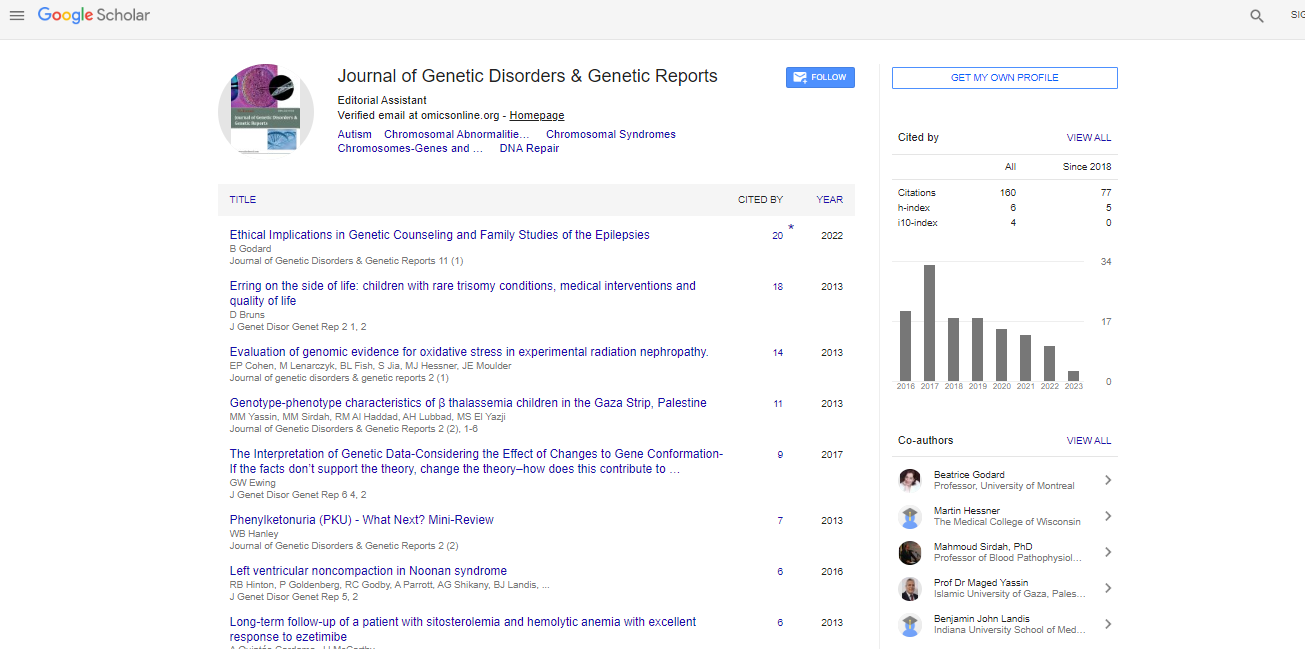Commentary, Vol: 12 Issue: 2
Hereditary Tendencies: Genetic Disorders and their Association with Cancer
Sarah Finning*
1 Department of Human Genetics, Emory University School of Medicine, Atlanta, USA
*Corresponding Author: Sarah Finning,
Department of Human Genetics, Emory
University School of Medicine, Atlanta, USA
E-mail: sarah@finning.edu
Received date: 29 March, 2023, Manuscript No. JGDGR-23-99517;
Editor assigned date: 31 March, 2023, Pre QC No. JGDGR-23-99517 (PQ);
Reviewed date: 14 April, 2023, QC No. JGDGR-23-99517;
Revised date: 21 April, 2023, Manuscript No. JGDGR-23-99517 (R);
Published date: 28 April, 2023, DOI: 10. 4172/2576-1439.1000200
Citation: Finning S (2023) Hereditary Tendencies: Genetic Disorders and their Association with Cancer. J Genet Disor Genet Rep 12:2.
Abstract
Genetic disorders are conditions caused by abnormalities in an individual's genetic material. While genetic disorders can manifest in various ways, including developmental disabilities and metabolic disorders, some genetic disorders are associated with an increased risk of cancer. Understanding the relationship between genetic disorders and cancer predisposition is crucial for accurate diagnosis, effective prevention strategies, and personalized cancer management. This paper aims to explore the connection between genetic disorders and cancer predisposition, highlighting the underlying mechanisms and clinical implications.
Description
Genetic disorders are conditions caused by abnormalities in an individual's genetic material. While genetic disorders can manifest in various ways, including developmental disabilities and metabolic disorders, some genetic disorders are associated with an increased risk of cancer. Understanding the relationship between genetic disorders and cancer predisposition is crucial for accurate diagnosis, effective prevention strategies, and personalized cancer management. This paper aims to explore the connection between genetic disorders and cancer predisposition, highlighting the underlying mechanisms and clinical implications.
Certain genetic disorders are known to confer an increased risk of developing specific types of cancer. These disorders are typically caused by mutations or alterations in specific genes involved in DNA repair, cell cycle regulation, or tumor suppression. The presence of these genetic mutations can disrupt the normal mechanisms that prevent the uncontrolled growth and division of cells, leading to an increased likelihood of cancer development.
Examples of genetic disorders associated with cancer predisposition include hereditary breast and ovarian cancer syndrome (caused by mutations in the BRCA1 and BRCA2 genes), Lynch syndrome (associated with mutations in DNA mismatch repair genes), and Li- Fraumeni syndrome (resulting from mutations in the TP53 tumor suppressor gene). Individuals with these genetic disorders have a significantly higher lifetime risk of developing breast, ovarian, colorectal, and various other types of cancer.
The mechanisms underlying cancer predisposition in genetic disorders are diverse and depend on the specific genetic alterations involved. However, common mechanisms include impaired DNA repair, compromised cell cycle regulation, and increased genomic instability.
Many genetic disorders associated with cancer predisposition involve mutations in genes responsible for DNA repair pathways. Defects in these pathways compromise the ability of cells to repair DNA damage properly, increasing the accumulation of genetic alterations and the likelihood of malignant transformation.
Disruptions in cell cycle regulation are also frequently observed in genetic disorders associated with cancer predisposition. Mutations in genes involved in cell cycle checkpoints and tumor suppressor pathways can lead to uncontrolled cell division, reduced apoptosis, and an increased potential for the survival and proliferation of cancerous cells.
Furthermore, genetic disorders associated with cancer predisposition often exhibit increased genomic instability. Chromosomal rearrangements, DNA copy number variations, and other genetic aberrations contribute to the accumulation of additional mutations and genomic alterations that promote cancer development.
The identification of genetic disorders associated with cancer predisposition has significant implications for clinical management, including diagnosis, screening, and risk reduction strategies.
Accurate diagnosis of genetic disorders associated with cancer predisposition is essential to identify individuals at increased risk and provide appropriate management. Genetic testing plays a crucial role in the diagnosis of these disorders. Various genetic testing approaches, such as targeted gene sequencing, multi-gene panel testing, and whole exome sequencing, can be utilized to identify pathogenic mutations in cancer predisposition genes. Genetic counseling is an integral part of the diagnostic process, providing individuals and families with information about the inheritance patterns, cancer risks, and available preventive measures.
Individuals with genetic disorders associated with cancer predisposition require enhanced cancer screening and surveillance protocols to detect malignancies at an early and potentially curable stage. The specific screening guidelines vary depending on the genetic disorder and associated cancer risks. For instance, individuals with hereditary breast and ovarian cancer syndrome may undergo regular breast imaging (mammography, MRI) and ovarian cancer screening (transvaginal ultrasound, CA-125 blood test). Lynch syndrome may necessitate colonoscopy and other screenings for colorectal and other associated cancers.
 Spanish
Spanish  Chinese
Chinese  Russian
Russian  German
German  French
French  Japanese
Japanese  Portuguese
Portuguese  Hindi
Hindi 



